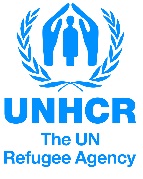UNHCR and Humanitarian Community ‘Pushing Boundaries with Innovation and Creativity” in the Diffa Region
 Ms. Liz Ahua with Fatouma and her father at the Diffa Distance Education Centre, receiving her end of year exam result
Ms. Liz Ahua with Fatouma and her father at the Diffa Distance Education Centre, receiving her end of year exam result
Despite the gravity of the current emergency situation in the Diffa region, the UNHCR Regional Representative and Regional Refugee Coordinator for the Nigeria situation, Ms. Liz Ahua was motivated by what she saw as “an operation that pushed boundaries with innovative and creative solutions to removing obstacles, rather than facing challenges in the traditional way”.
Ms. Ahua visited the Diffa region of Niger from the 8th – 10th of August. The mission was accompanied by the UNHCR Niger Deputy Representative, Mr. Abdouraouf Gnon-Konde and the Director General for Civil Status and Refugees, Mr. Malangoni. During the mission, Ms. Ahua visited the Governor of the Diffa region to discuss the Government strategy in the region, and to express support and solidarity. Despite the difficulties faced by the Government, they maintain an open-door policy to those seeking protection. As remarked by Ms. Ahua, this is not always the case, “here in Niger you have a Government who is open to learning, they have an ear to listen and they are willing to consider what the community poses to them, this is not always the case in other countries, where Governments put up fences before they even listen to your cause, you are fortunate in Niger with such an excellent example”. The Government similarly expressed their gratitude for the support of the humanitarian community in facing this challenging situation. As emphasized by Mr. Malangoni of the DGEC-R, “the Government is grateful for the visit, it is essential that the message of the complexity of the situation and the efforts of the Government is shared at higher levels, while the population are so happy to hear of someone coming from far away to hear their stories”.
 Ms. Liz Ahua and Mr. Abdouroauf Gnon-Konde arriving on mission at the Diffa airport on the 8th of Augus
Ms. Liz Ahua and Mr. Abdouroauf Gnon-Konde arriving on mission at the Diffa airport on the 8th of Augus
During the mission, Ms. Ahua visited the Diffa Distance Education Centre, one of three education centres for Nigerian high school students, supported by UNHCR and COOPI. During the visit, 40 junior cycle students who recently were assisted to travel to Kano in Nigeria to complete their end of year exams were presented with their results, with scenes of joy amongst the students, tutors and parents alike. “This simple and inexpensive project removes vulnerable children from harm’s way, saving children from the jaws of radicalization” according to Ms. Ahua. For more information on the project, see: http://unhcrniger.tumblr.com/post/147088328514/positive-steps-forward-for-distance-education.
Ms. Ahua also praised other innovative projects which are ongoing in the region, such as the gas as domestic energy project, which will reach 20,000 vulnerable families in the region before the end of 2016. This project is innovative in that it provides solutions to multiple problems - environmental degradation, increasing the purchasing power of the population, while reducing protection risks, in particular regarding SGBV attacks against women and girls searching for firewood. Another project which began in 2014, and is ongoing with the support of the authorities is the urbanization project, which provides a long-term and sustainable solution as regards to access to land in a legal manner for vulnerable families, whilst also providing economic opportunities for the authorities of the communes involved.
On the second day, the mission visited the site of Gagamri on the RN1, where preparations were underway between the Government and UNHCR to voluntarily relocate Nigerian refugees to the refugee camp of Sayam Forage. Since the 8th of July, 1,961 refugees have been assisted to move to the camp, where they can be assured at least of basic assistance and protection. With over 240,000 displaced persons throughout the region, mainly living in precarious situations at spontaneous sites along the RN1, the Government is prioritizing the relocation of refugees to a safer environment, far from the insecure border areas close to the Komadougou River. As emphasized by the UNHCR Niger Deputy Representative, this process cannot be done alone, it depends on the State and most importantly on the refugees themselves, and the voluntariness of their decision to relocate. During a meeting with the beneficiaries in Gagamari, Ms. Ahua expressed solidarity with the refugees and the struggles they are facing.
 Ms. Ahua discussing the relocation of Nigerian refugees with the UNHCR team and beneficiaires at the site of Gagamari on the Route Nationale 1.
Ms. Ahua discussing the relocation of Nigerian refugees with the UNHCR team and beneficiaires at the site of Gagamari on the Route Nationale 1.Further discussions were held with representatives of the many humanitarian organizations working in the region. As pointed out by Ms. Ahua, the Lake Chad Basin Crisis - despite its severity, remains one of the most under resourced emergencies. Partners expressed similar messages including the desperate need for additional funding, which is flexible enough to respond to the complex and ever changing context in Diffa. They emphasized the need to find a formula for the region that works, balancing emergency and long-term assistance, creating the possibility of self-reliance for the displaced and vulnerable host populations. As pointed out by Mr. Gnon-Konde, “beneficiaries want opportunities to provide for themselves, they used to do things for themselves, they were independent. Nobody wants to depend on aid”. The departing message of Ms. Ahua was that she was touched by the “drive for creative but simple solutions, with a lasting impact on the lives of the beneficiaries”, with a promise to raise the issues presented to her at the regional and global level, in an effort to mobilize funds and save lives in the region.

